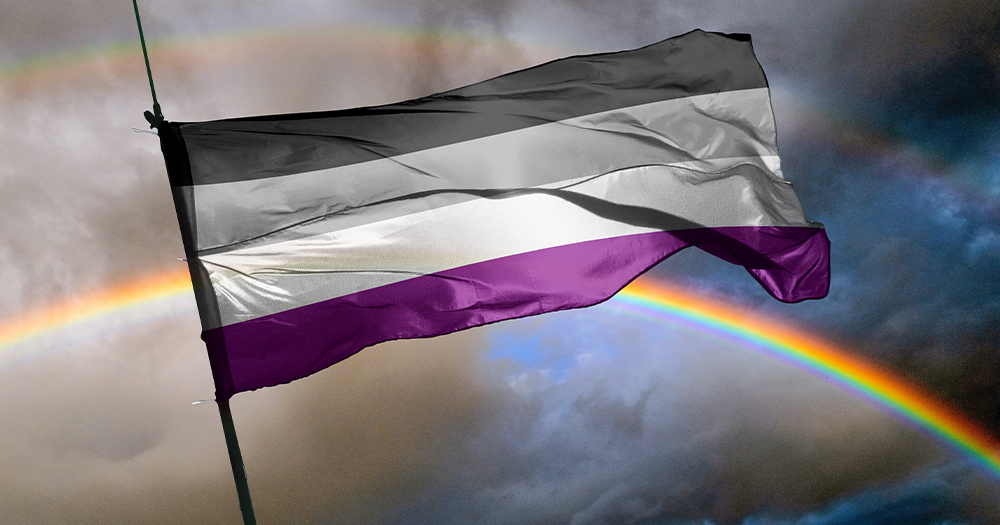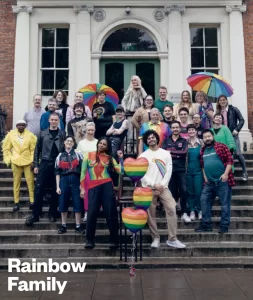One of the main misconceptions about asexuality is that all asexual people want absolutely nothing to do with sex. While this is accurate for some asexual people, it couldn’t be further from the truth for many others. Asexuality doesn’t mean aversion to sex because it refers not to a person’s sexual behaviour but to their sexual attraction to others. Sexual attraction is just one of many reasons why people choose to have sex, and while it might be the most common, it is far from the only one. There are a vast array of reasons why an asexual person could choose to have sex, including hormonal factors, bodily sensations, a desire to feel closer to a partner, and many more.
When I asked Michael (he/they) from Asexual Visibility and Education Network (AVEN) to better explain this, they said that, because asexuality is about sexual attraction, “in itself it says nothing about attitudes towards sex. Just like you can have gay people who have a high and low sex drive, or anything in between, the same is true for asexual people.”
“An asexual person can be anywhere from repulsed by sex, to indifferent, to – at the other end – even enjoying sex, as an act of intimacy with a partner,” they continued. “Some aces have never had sex whereas others have been in sexual relationships their entire life!”
Sarah Armstrong (she/her), an asexuality activist who lives in Dublin, specified that “asexuality” is an umbrella term and thus encompasses a wide range of experiences. “There are people who have a lot of sex and are very happy doing so. There are people who have more limited relationships to the sex that they are having, it’s less frequent, or it is in specific action. And then there are people who, like me, do not have any sex at all,” she explained.
Moreover, it is important to acknowledge that asexuality, like other sexual orientations, exists on a spectrum. This means that, in terms of how people experience sexual attraction to others, there is a great deal of diversity within the asexual community.
“We have micro-labels, like demisexual, which is someone who will experience sexual attraction when there is a close emotional connection form. We have gray-ace, which is people who rarely experience sexual attraction,” Sarah explained.
These are but a few of the words that the asexual community has come up with for themselves on the chance that these terms and their definitions will resonate with others and whoever hears them will find something they need.
“But even within labels, there’s just such a difference in terms of what people experience. And that’s one of the wonderful things about being queer, but specifically about being asexual: it’s that you are writing your own roadmap on how you want to position sex in your life,” Sarah added.
One thing that many asexual activists try to make clear is that their choices about how to engage in sex (or not) are a personal attitude, “not a political statement”. As Sarah explained. “It’s not a statement of belief, as in ‘this is what I believe to be morally correct’. It’s an asexual person saying, ‘this is the choice that I’ve made for me based on what I want, the kind of relationships that I want to seek out. And the types of affection that I feel are fulfilling to me’, rather than ‘this is a statement that I’m putting on other people’.”
Expanding on this, she shared, “I’ve had situations where I’ve told people I’m asexual, and then there’s a sort of, not a fear, but a slight worry of ‘Is this person going to judge me?’And even though I don’t have sex – it’s not part of my life – I don’t judge anyone. I want people to be able to be their full selves, and to have that freedom.
“And I think it’s important, in terms of the wider LGBTQ+community being connected and being in solidarity with each other, that people who are having sex are aware and are comfortable with the idea that no asexual person is prescribing an element of celibacy on them,” Sarah added.
Many asexual people are also sex positive and, despite popular beliefs, the two are not mutually exclusive. Sex positivity refers to having a positive attitude towards sex and treating it as a normal and healthy part of life rather than a taboo topic. The sex-positive movement strives to remove shame and stigma from sex, challenging harmful social and cultural norms about sexual preferences and consensual sexual practices.
The concept of sex positivity was first introduced during the sexual revolution in the 1960’s and early 1970’s, when supporters of the movement advocated for freedom of sexual expression in a variety of areas, including premarital sex, pornography use, public nudity, contraceptive use, gay liberation, interracial marriage, women’s rights, and other issues.
The movement has evolved through time and nowadays sex positive people advocate for safe and consensual sexual practices and sex education, focusing on personal agency and choice when it comes to sex.“If we’re having a conversation about sex and sexuality,that conversation is incomplete without asexual people,” Sarah said.
“Unless you include people of every identity inthe LGBTQ+ community, unless you include everyone, the conversation is not complete.”Bringing the asexual perspective into the sex positive movement is not only beneficial to the asexual community, but to the movement itself. This is because asexuality challenges some of the main preconceptions about sex that are held in Western societies: that people are expected to engage in sex, that everyone wants and desires sex.
But advocating for freedom in sex should also mean advocating for a freedom NOT to have sex.“We all want the same thing, really!” Michael told me. “A liberal attitude towards sex implies that just like having lots of sex with other consenting adults is a perfectly valid choice, so is having no sex at all, or anywhere in between. No one should be shamed for their lifestyle choices.” The sex-positive movement was born to advocate for a person’s right to have all the sex they want without shame, even if the right amount for them is none.
It’s about advocating for agency in a way that includes the option not to act at all and about normalising both having and not having sex. As Sarah plainly put it, sex is “a part of being human, but it’s not a key part of being human. And that’s okay”. She added, “Sex being valid and sex being important and sex being meaningful for people does not require everyone to be doing it.
“Sex is not important because everyone is doing it. Sex is important because there are people who want to do it.” She added, “Sex is just one of a hundred ways that people seek out connection. Sex does not exist in isolation. Even if a very short-term sexual encounter takes place between people, it exists within a context of people seeking out connection. But asexual people bring in a different perspective on different ways that emotional needs can be fulfilled.
Sarah said that it is also important for the sex-positive movement to acknowledge “that there are asexual people who are having sex for reasons that are individual.” Exploring what those reasons are can lead to a broader conversation about sex, one where all people with different experiences can find what they need to hear.
“The sex-positive movement needs to allow those asexual people to speak on why they want to have sex, on when they choose to, why they choose to. Because the reasons for an asexual person to choose to have sex might be slightly different to a non-asexual person who is choosing to have sex. And I think allowing for those asexual people to speak on how they gain enjoyment, or they gain emotional fulfilment, how they gain happiness from that, is important.”
“I think we all have something to learn from each other. I think the LGBTQ+ community exists so that we can all learn from each other. And I’ve learned a massive amount about boundaries and fulfilling my needs from members of the LGBTQ+ community who have sex,” Sarah said.
“And it’s only by giving people access to a space where they can talk about removing shame from seeking fulfilment that people of all kinds of identities can work together on figuring that out. Because the whole purpose of the LGBTQ+ community is that no one growing up has had the support of the messaging from society that has helped them feel confident, that has taught them how they can exist in the world and be happy and be healthy and be fulfilled.”
“So when you allow people to figure out together how to remove shame from sex, from seeking connection, from all the immensely diverse ways that people can seek out satisfaction, it’s a more complete conversation. And it’s more fit for purpose. It’s more likely to achieve its goal,”
Sarah continued.“It allows the LGBTQ+ community to become more diverse and gain a more complete and whole understanding of how people relate to sexuality, which is obviously the whole point. And I think the fact that we’re coming to have these conversations is a sign of the fact that the LGBTQ+ community is serving the function that it was supposed to have.”
© 2024 GCN (Gay Community News). All rights reserved.
This article was published in the print edition Issue No. 384 (June 1, 2024). Click here to read it now.
Support GCN
GCN is a free, vital resource for Ireland’s LGBTQ+ community since 1988.
GCN is a trading name of National LGBT Federation CLG, a registered charity - Charity Number: 20034580.
GCN relies on the generous support of the community and allies to sustain the crucial work that we do. Producing GCN is costly, and, in an industry which has been hugely impacted by rising costs, we need your support to help sustain and grow this vital resource.
Supporting GCN for as little as €1.99 per month will help us continue our work as Ireland’s free, independent LGBTQ+ media.

